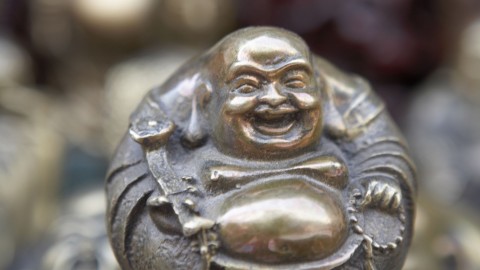I have heard, once it happened: In the bazaar Mulla Nasruddin saw a crowd gathered around a small bird offering big prices for it.
“No doubt the price of birds and fowls has gone up,” Mulla thought to himself. He went home, and after some chase, succeeded in catching his old turkey. In the bazaar they offered only two silver coins for the turkey.
“It is not fair,” Mulla said. “My turkey is several times as big as that little bird auctioned for so many gold pieces.”
“But that bird was a parakeet – it talks.”
Mulla took a glance at the turkey dozing in his arms. “Mine meditates,” he said.
Become a turkey – meditate. Thinking is just dreaming logically; it is creating verbal palaces. And sometimes one can get caught so much in the verbal; then one completely forgets the real. The verbal is just a reflection.
Language is one of the reasons we got so caught up in the verbal. For example, in English it is very difficult to drop the use of the “I.” It is very prominent in English. The “I” stands so vertical – almost a phallic symbol. It is phallic. That’s why perceptive people like E. E. Cummings started writing “I”, in the lower case. And it is not only vertical, phallic, when you write. When you say, “I,” it is phallic, like an erection, egoistic. Just watch how many times “I” has to be used. And the more you use it, the more it is emphasized, the more ego becomes prominent – as if the whole English language hangs around “I.”
But in Japanese it is totally different. You can talk for hours without using “I”. It is possible to write a book without using “I”; the language has a totally different arrangement. The “I” can be dropped easily.
No wonder Japan became the most meditative country in the world and achieved, to the higher peaks of Zen, satori, and samadhi. Why did it happen in Japan? Why has it happened in Burma, in Thailand, in Vietnam? All the countries which have been influenced by Buddhism, their language is different from other countries which have never been influenced by Buddhism because Buddha said there is no “I” – anatta, anatma, no-self, ness, there is no “I.” That emphasis entered the languages.
Buddha says, “Nothing is permanent.” So when for the first time the Bible was being translated into Buddhist languages, it was very difficult to translate it. The problem was very basic – how to put “God is.” Because in Buddhist countries “is” is a dirty word. Everything is becoming, nothing is. If you want to say, “The tree is,” in Burmese, it will come to mean, “The tree is becoming.” It will not mean, “The tree is.” If you want to say, “The river is,” you cannot say it in Burmese. It will come to mean, “The river is becoming.” And that’s true because the river is, never is. It is always in a process – the river is; “Rivering.” It is not a noun; it is a verb. The river is; Rivering, becoming. Never in any stage can you catch it as “is.” You cannot take a snap of it; it is a movie – continuous process. You cannot have a photograph – the photograph will be false because it will be “is,” and the river never is.
Buddhist languages have a different structure to them; then they create a different mind. The mind depends much on language; its whole game is linguistic. Beware of it.
Let me tell you one anecdote. It happened in a very esoteric, small Sufi community: A pedantic grammarian happened to pass by a Sufi gathering and heard the sheikh say, “Indeed, we are from Him and to Him we will return.”
At this the grammarian began to tear his clothes and utter strange yawps and cries. People gathered around him, wondering what had happened; he had never been of religious inclination or mystical talent.
Seeing that the Koranic line had brought the grammarian to such ecstasy, the sheikh said again, “Indeed, we are from Him and to Him we will return.” And again the grammarian tore his clothes, stomped his feet, and groaned and yelled.
When the session was over and the grammarian had not a piece of clothing left on his body, the sheikh took him into a comer, splashed water on his face, and said, “Tell me, sir, what happened that a paraphrase from the Koran made you behave like that?”
“Why not!” the grammarian said vehemently. “In all my life, in all my speeches and writings, and in all the writings of scholars, recent and old, the first person plural has been used with shall, and not as you say, “To Him we return”!
The question was of “will” and “shall” – “will” is not right! Looks absurd, looks almost mad, crazy, but this is what is happening. If Buddha comes to you and says, “There is no God,” you immediately get anxious, worried. What has he said? He has simply said something which goes against your linguistic pattern, that’s all. If he says, “There is no self, no ‘I,’” you become disturbed. What has he done? He has simply taken away a strategy of your ego, nothing else. He has simply shattered your linguistic pattern.
It is happening every day here. When I say something, and I destroy some linguistic pattern in you, you become annoyed, you become angry. If you are a Christian, of course, you have a Christian house of language. If you are a Hindu you have a Hindu house of language. I am neither, and I am here to destroy all linguistic patterns. You bet you get angry. You become annoyed. You start thinking, what to do. But what am I doing? What can I take from you? Can Buddha take God from you if you have known God – can he take it from you? Then there is no question. But he can take a linguistic theory; he can take a hypothesis from you.
“Experience is the result of the inability to differentiate between purusha, pure consciousness, and sattva, pure intelligence….” Language belongs to sattva, theories belong to sattva, philosophies belong to sattva. Sattva means your intelligence, your mind. Mind is not you.
Christianity, Hinduism, Jainism, Buddhism, belong to the mind. That’s why Buddhist monks say, “If you meet Buddha on the way, kill him immediately.” Buddhist monks saying that? They say, “Kill the Buddha if you see him, immediately.” They are saying, “Kill the mind, don’t carry a theory about the Buddha; otherwise you will never become a Buddha. If you want to become a Buddha, drop all ideas about Buddha – all ideas. Kill Buddha immediately!” They say, “If you utter the name of Buddha, immediately wash and rinse your mouth – the word is dirty.” Buddhist monks saying that? They are amazing people… but really wonderful. And they mean it.
If you can see their point, you will become able to see many more things.
Bodhidharma says, “Burn all scriptures, all – including Buddha’s.” Not only the Vedas, Dhammapada included – burn all scriptures. There is a very famous painting of Bin-chi burning all the scriptures, creating a holi. And they were very, very deep into reality. What are they doing? They are simply taking away your mind from you. Where is your Veda? It is not in the book; it is in your mind. Where is your Koran? It is in your mind; it is not in the book. It is in your mental tape. Drop all that; get out of it.
Intelligence, the mind, is part of nature. It is just a reflection. It looks almost like the real, but remember, even “almost like the real,” then too it is not real. It is as if in the full moon night you see the moon reflected in the cool, placid lake. No ripple is arising; the reflection is perfect, but still it is a reflection. And if the reflection is so beautiful, just think about – the real. Don’t get caught in the reflection.
What Buddha says is a reflection, what Patanjali writes is a reflection, what I am saying is a reflection.
Don’t be caught in it. If the reflection is so beautiful, try reality. Move away from the reflection towards the moon.
And the path is going to be just the opposite to the reflection. If you go on looking at the reflection and you become hypnotized by the reflection, you will never be able to see the moon in the sky, because it is diametrically opposite. If you want to see the real moon, you will have to move away from the reflection – you will have to burn scriptures and you will have to kill Buddhas. You will have to move in the very opposite, diametrically opposite, dimension. Then your head moves towards the moon; then you cannot see the reflection. The reflection disappears.
All scriptures at the most can train and discipline your intelligence. No scripture can lead you towards the real, pure purusha – the witness, the awareness.
“… inability to differentiate between purusha, pure consciousness, and sattva, pure intelligence….” That is the very cause of getting into ignorance, into the dark night, into the world, into matter, losing contact with your own reality and becoming a victim of your own ideas and projections.
“… although they are absolutely distinct.” You can see that. Even the greatest idea is different from you – you can watch it arising as an object inside you. Even the greatest idea remains a thing within you and you remain far away from it, a watcher on the hill looking down at the idea. Never get identified with any object.
“Performing samyama on the self interest brings knowledge of the purusha separated from the knowledge of others” – “SVARTHA SAMYAMAT PURUSHA GYANAM.” Patanjali is saying, “Selfishness brings the absolute knowledge” – svartha. Become selfish, that is the very core of religion. Try to see what your real self-interest is, where your real self is. Try to distinguish yourself from others – “pararth,” from the others.
And don’t think that the people who are outside you are the others. They are others, but your body is also the other. It will return to the earth one day; it is part of the earth. Your breathing is also the other; it will return to the air. It is just given to you for a time being. You have borrowed it; it will have to be returned. You will not be here, but your breath will be here in the air. You will not be here, but your body will lie down in deep sleep in the earth – dust unto dust. That which you think of as your blood will be flowing into rivers. Everything will go back.
But one thing you have not borrowed from anybody: that’s your witnessing, that’s your sakshi bhaw, the awareness.
Intellect will disappear, reasoning will disappear. All these things are like formations of clouds in the sky: they come together, they disappear, but the sky remains. You will remain as a vast space. That vast space is purusha – the inner sky is purusha.
How do I come to know it? Samyama for self-interest. Bring your concentration, dharana; your contemplation, dhyan; your ecstasy, samadhi; bring all the three to your self-interest – turn in. In the West people are turning “on” – then you turn out. Turn in. Just bring your consciousness to a focus, to who you are. Differentiate between the objects. Hunger arises – this is an object. Then you are satisfied, you have eaten well, a certain well-being arises – that too is an object. Morning comes – that too is an object. Evening comes – that too is an object. You remain the same – hunger or no hunger. Life or death, misery or happiness, you remain the same watcher.
But even in looking at a movie you get caught. You know well there is only a white screen and nothing else and shadows are moving on it, but have you watched people sitting in a movie house?
A few start crying when something tragic is happening on the screen. Their tears start coming. Just see: there is nothing real on the screen, but the tears are very real. The unreal is bringing tears?
People reading a story in a book become so excited. Or seeing a picture of a nude woman become sexually aroused. Just see, there is nothing. Just a few lines – nothing else. Just a little ink spread on the paper. But their sexual arousal is very real.
This is the tendency of the mind: to get caught with the objects, become identified with them.
Catch yourself red-handed as many times as you can. Again, again, catch yourself red handed and drop the object. Suddenly you will feel a coolness, all excitement gone. The moment you realize there is only the screen and nothing else, for what am I getting so much excited, for what…. The whole world is a screen, and all that you are seeing there are your own desires projected; and whatsoever you want, you start projecting and believing. This whole world is a fantasy.
Tags: Patanjali Yoga Sutra 39 Mind Is Not You










